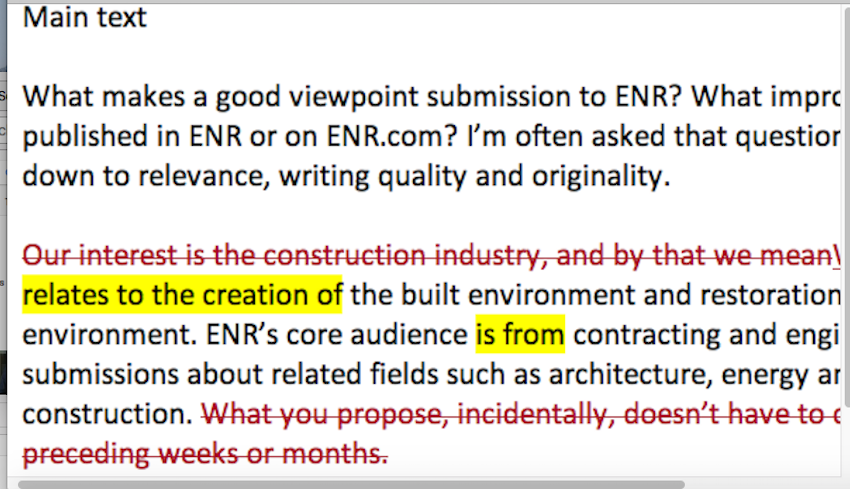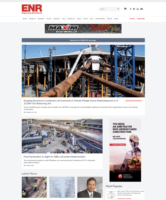What makes a good viewpoint submission to ENR? What improves the chance that it will be published in ENR or posted on ENR.com? I’m often asked those questions, and it comes down to relevance, writing quality and originality. Our interest is the construction industry, and by that we mean anything that relates to the creation of the built environment and to the restoration and protection of the natural environment. ENR’s core audience consists of contractors, engineers and owners, but we also like submissions about architecture, energy and technology.

We publish commentary that includes advice, but we place extra value on arguments and anecdotes about how things are and how they could be better. We look for views about injustices and needed change, traditions that should be preserved and reflections on important construction business practices, design approaches, companies and employment. We also welcome contributions about public policy and how it is reflected in codes and regulations, laws and legislation, and about what’s best for the industry and society. We want to know what makes projects finish on time and on budget, what makes for a successful company, what promotes safety. What you propose, incidentally, doesn’t have to comment on what’s been in ENR in the preceding weeks or months.
The first thing about the writing itself is to leave out the bullet points; we want continuous prose. We place a premium on first-person accounts and concrete language where the generalizations are less drawn out than the details that support them.
Some indication is needed that you are qualified to make your argument. It can be your current job or past experience. It can also be a special vantage point—for example, one of ENR’s memorable viewpoints was from the son of a construction executive who just didn’t share his father’s interest in the industry. By experience we mean everything from digging the foundations of a building as an equipment operator to being the chief executive of the biggest international engineering and construction company. You may work as the construction manager of a development company, the plant manager at a ready-mix supply company, a mason, an estimator or a surety broker—anything.
What we don’t want are stale recitations of ideas that have already been very thoroughly discussed in ENR or in public. Nor do we want contributions from individuals or companies that have an undisclosed agenda—if you or your company would benefit from your argument, please make that clear.
First-Person Accounts Sought
The first thing about the writing itself is to leave out the bullet points; we want continuous prose. We place a premium on first-person accounts and concrete language where the generalizations are less drawn out than the details that support them. Honest, from-the-heart and cliché-free words will get both you and ENR more respect and more eyeballs (and less editing by us) than meant-to-impress posturing and platitudes. We also want you to have fun expressing yourself.
We admit, faults sneak into our own staff-written articles and commentary. But we try to stick to some of George Orwell’s rules of good writing by using compact sentences and avoiding passive phrases wherever possible. And colorful adjectives or metaphors always help: They pump oxygen into writing that might otherwise die on the page.
Originality helps, too. There are some topics that we deal with over and over again, but if you attack them in a fresh way, with a good story or new approach or idea, we always want to hear about it. We’ve published short memoirs and slices of life, what’s on your mind and what you are building, why you love your job or why your job is killing you.
Before proposing something, see what we’ve published by navigating to ideas/viewpoints on ENR.com. Put the word “viewpoint” in the email subject field—you’d be surprised how many people fail to do that. While a page of commentary in ENR is about 700 words, we are also looking for longer essays of 1,200 words or so that could appear on two pages.
We will read and reply to as many email queries and submissions as we can, but we don’t guarantee a response to all of them. (If you don’t get a response after 10 days, feel free to send a reminder email). We ask that the submission not have appeared in another publication or website, but 90 days after we publish your commentary you are free to use it again any way you wish.
Think of ENR’s viewpoint pages in the national issue and regional editions as the construction industry’s op-ed section. At their best, these pages enrich and clarify matters in an often perplexing and fast-changing business.
If you have an idea for a column, please contact Viewpoint Editor Richard Korman at kormanr@enr.com.





Post a comment to this article
Report Abusive Comment